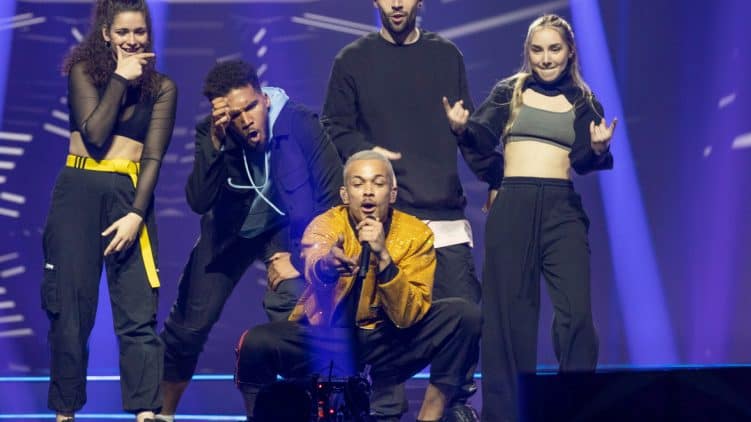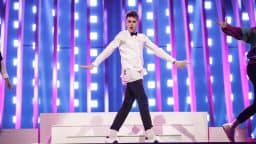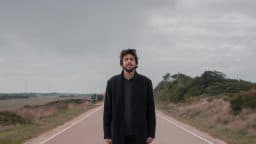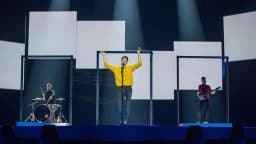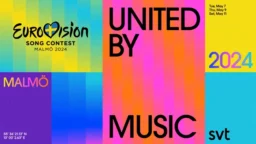Thank heavens – Benny Cristo’s back.
Last year he introduced himself in the first seconds of his Eurovision song KEMAMA, saying: ‘Ay! Benny Cristo and Glowsticks, some of you already know.’
This year no introduction is needed. With his omaga he brings a different musical vibe, but a similar upbeat lyrical style.
It’s the day after Eurovision 2021’s grand opening ceremony. Dutch seagulls are flying in front of his window, so let’s talk about smooth – and not so smooth words.
First of all: how are you, as a sensitive person, coping with this frantic Eurovision life?
I’m happy that It’s been going on for two years already, you know. I got to experience the first year and now I can enjoy it. But if it had been like last year, when it comes to preparations and stuff, it would have been be a little bit hectic. The reactions to KEMAMA, my first song, and to my first music video, were intense. So as a sensitive person, I was on a roller coaster. But this year, I’m chillin’, I’m chillin’.
Let’s talk about the lyrics of your song, of omaga. First of all: kudo’s for addressing COVID pounds in your song. I think there are many songs about COVID now, but I don’t think any of them talked about people gaining weight in lockdown times.
I tried to… I tried to address it in a cool way. I didn’t want to use the obvious words, like ‘COVID’ and ‘pandemic’, so I chose ‘apocalypse’. And it’s about real problems. I was just talking to people, like, ‘what have you been doing’, and ‘oh, I’m fat,’ and ‘yo, don’t worry, man, doesn’t matter, chill.’ You know, real life.
Were there lyrics that you came up with and felt: ah yes, now I found something good?
Me and Filip Vlček had a skeleton of the song written – you know I’m writing the lyrics, Filip writes the music and we were putting it together. And once we found out that it would be a possible Eurovision entry, I started playing around with it a bit, and then I wanted to incorporate a little bit of Czech language in it. And that went super well. Unexpectedly well. I don’t like to praise myself too much, I’m not like: ‘Yo, Ben, you’ve done a good job’. But coming up with the lines ‘můžeš být u mě klidně, můžem dělat jakoby (‘you can just visit me, we can just pretend that…) and then answer in English: ‘…there ain’t no apocalypse,’ combining the Czech language with the English language, and that it made sense… Yeah, when that came together, I was just like, daaaaaaahhhhhh… I’m super happy about this.
I guess my favorite line would be the apocalypse line itself: ‘There ain’t no apocalypse, long as you’re here on my lips.’ It’s an awesome play of words.
It’s cool, but when I’m listening to it I think: isn’t it too childish? On the other hand: I was that kind of person, you know, I was that naïve. So I guess it displays happiness, or naivety, or, like, stupidity. [sings in an exaggerated way:] ‘There ain’t no apocalypse, long as you’re here on my lips.’
Is that something you do a lot? Going back to lyrics and rethinking them?
Generally, the more time you spend with the song, the more things pop out. For example, yesterday this funny thing happened. We were on the turquoise carpet for the opening ceremony of the contest. And everybody sings their song for the different media outlets. So at one point me and my dancers started singing, because we just want to show like, yo, we also have a song. So we go: ‘Omaga, omaga, you’re so beautiful…’ Which is nice, no problem. But at there point there is another delegation passing by. And we continue singing: ‘Omaga – why don’t you let me have it?’ And well… this particular line when another delegation is crossing? Not the smoothest. So I was: god fucking dammit, fuck!
Haha, well, I guess that happens when you write about dating? You published many songs last year, both in Czech and in English – in what sense would you say these songs are related to each other, lyrically?
My songs usually describe some parts of my life. I’m really not big on metaphors. And, as you already heard, if there are metaphors, they’re cheeky. They’re easy metaphors. If the lyrics are positive, you’ll know it straightaway, if they’re sad you’ll know it straightaway. They’re very people oriented. I tend to be very simple when it comes to lyrics. Not because I’m a simple person, but I just want everybody to get it. And I want them to vibe with it. So it’s just about my life, and that of my close friends.
So that’s why you also wrote a song called Lockdown love, and PRO NÁS DVA in which you even mention the eggplant emoji…
Right. See? That’s that’s what I mean, an eggplant emoji – very straightforward. Actually, that might be – thank you – that actually might be the thing my lyrics have in common. They don’t beat around the bush. You know, people always tell me that I’m a person that, like we say in Czech, ‘has his heart on his tongue’. I think they are right. And sometimes it’s stupid. Like when you’re on the turquoise carpet, and you start singing the song and it just bites you back and you’re like: fuuuuuck…
Do you have the idea that the more personal you write, the more people will see a song of yours as their own?
Hopefully! Because that was the point. When I’m writing songs, I sometimes try to be less specific, even though It’s my own story. I sometimes think: how do I say things as simple as possible, but also: how do I not exclude anybody? How do I make it less ‘only for girls’ or ‘only for men’? I’m always focusing on trying to write songs that anyone could enjoy.
I read about many cool things you did, about projects that you did in Czech Republic, for instance with schoolkids, about the dangers of internet. How much of an activist would you say you are?
Not enough. I think you can always do more. I work on music and during the day I train and chill and have fun, and I don’t always focus on topics that could help other people. Because I do have that power and I do have the attention of other people, so I can make certain things move faster in the right direction. And I don’t do it. So calling myself a super big art activist would be a lie. It would be unfair to real activists. I have friends that that go to the trucks that are full of animals, ready to be slaughtered, and they go there with massive valves to spray water inside so that the animals at least can taste some good clean water for the first time before they die. These trucks have breathing holes for the animals, and these people put their hands through the holes and pet the animals, so that the animals at least feel some love before they get murdered… I’ve never done that because I just don’t have the heart for it. It would tear me apart. I can be very vocal when it comes to speaking out online, and I do a couple of things; I have been locked in a cage to show people that this is what we’re doing to animals. And I have projects coming up with real activists – but I want to do things the best way possible. And if I want to call myself activist I better give it my 100%.
But when we talk about omaga: over a year ago, when we were in lockdown for the first time, we were quite somber, not knowing what was happening to the world. Now, a year later, still being in lockdown, we sometimes just need the joy. We need the ease of your song. Don’t you think there is some activism there as well?
Ha ha, I like that. Yeah, there are definitely variations of activism. And in this sense, when it comes to being a positive activist, then I’m happy that you see it this way. I never thought about it, and I never thought it is activism. If in any way I can be of help for those that don’t get to voice their opinion or their fears or their stress… I never took it as activism, but it’s a really nice way of looking at it. So thank you.
You’re also an athlete, you are a snowboarder and you reached the top in Brazilian jiu jitsu. But now you’re in a competition with music, with joy, with dance. Isn’t that contradictory? How do you process that competitive element?
To answer that I think I’m gonna say something that probably solves a problem in my head as well. I used to compete in all parts of the world. So: me and my opponent have five minutes, the referee indicates we can start, and we go against each other. Whoever chokes the other guy first, wins, or whoever dislocates his limb to the point where he has to tap to be released, wins. The conditions are super fair and clear: we have the same weight, we have the same ranking. For me that’s a competition. Whereas here, literally every song is different. And beauty, or likings, are so subjective, so subjective. The way that I’m looking at it is like: this song is so cool and that song is so not me, but who am I to judge? You know, there are literally hundreds of millions of people watching, and then we’re going to be competing for which song is the best? I don’t see that as a competition. The only competition I see is myself. When people ask: ‘What do you think? What are your chances?’ I say: ‘You know what I’m really hoping? I really hope I’m gonna beat myself.’ Like, my first rehearsal sucked. But then my second rehearsal was better. And now I better kick Ben’s ass in the semi-final, you know? I hope I’m gonna beat Ben from the second rehearsal, because that Ben sucked compared to Ben who’s singing now. And I know a way to beat that guy – but all the other ones? I have no idea.
Last question: are you a reader?
Yes, I believe so. I do have to say that time recently has reduced my reading to a minimum. I’m very easily distracted, and I need a specific time and place and mood for books. I can’t read when it’s too loud, I can’t read if there is music, I can’t read if there are other people around, I don’t read in public spaces, I read under specific light, I don’t like white light. I need yellowy light. I need cozy atmosphere. I need good tea. I need a lot of things. But then my reading is amazing, because my imagination is crazy. If I read something, it’s like a big budget Hollywood movie in my head. Within two pages, I have that whole world around me planned, I’m on a journey. So yes, I’m a reader, but I’m a super specific reader.
Is there a book that influenced you a lot?
Yes. And it’s actually a book that is super short. Look, here in Rotterdam, even right now, there are seagulls everywhere. And my favorite book is called Jonathan Livingston Seagull. It’s from a writer called Richard Bach. He’s incredible. It’s about choices. If you’re thinking about doing something different with your life, and people around you tell you that you should stick to what you’re good at – then this is the book you should read, because it opens your eyes and makes you shakes off this self-doubt. I read this book when I was nineteen or twenty years old. I was working at the marketing department of a bank, and when I finished these, what is it, 150 pages, of the small book like this. And like I finished it, I was like: I’m gonna try singing. I was twenty years old and I had never opened my mouth to sing. Like never ever. There were no music teachers, there was nobody. I went to a singing competition, and long story short, I tried it, and it just worked. And the book says: is this what you want to do? Then just put everything into it, just do it. So I took all of the money that I made in the commercials I was doing part time, went to Toronto and recorded my first album. And it actually worked, people liked it and then ten years later, I sold out O2 Arena in Prague, two years after that I’m here, talking to you, so this just shows the power of books.
And it resonates with what your mother used to say to you: ‘If you’re the best in something, people will never bother you.’
Right! Reading it in the book, remembering what your mom always told you, and then combining these things makes you believe it even more. These are affirmations. At that time, when I was working in the bank, I had already won two championships, just because of my mother’s advice: ‘Be the best in what you do and you’ll get respect.’ And then, reading in a book that I should try to fly in the best possible way and invent new ways of flying, was like a mantra. It’s all mantras. They will confirm to you that the path you’re taking is the right one – if the words come from the right people and out of the right books.
And for people who write lyrics, like you, there’s always a chance that one of your lyrics becomes the affirmation that someone needs in their life.
Now that, that’s like a dream come true. Genuinely.
You’ll have millions of people hearing your lines this week. Not bad for a start.
That’s not bad at all.
